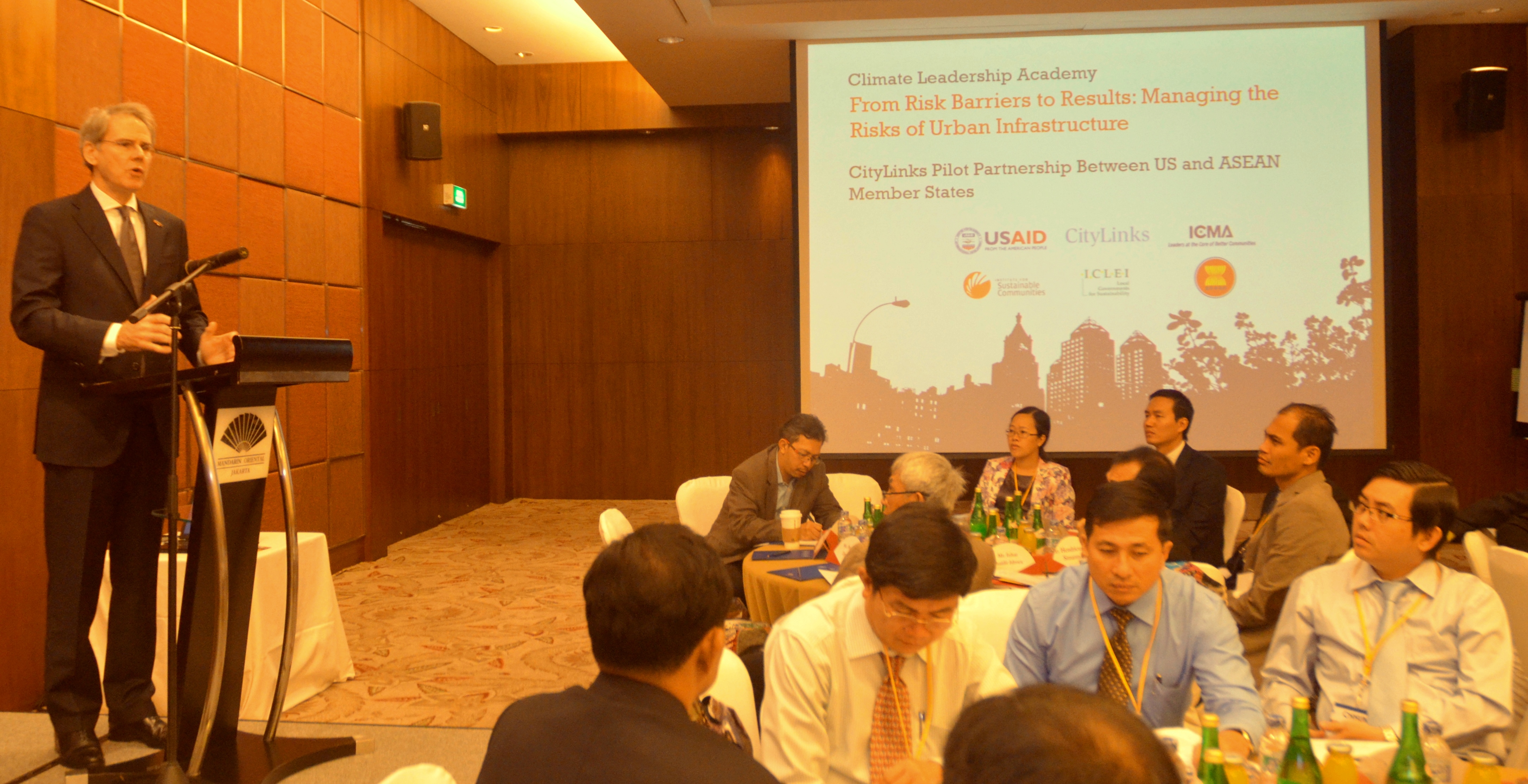
According to the Asian Development Bank, Asia’s urban population will likely rise from 17 to 55 percent by 2030, requiring cities to build sufficient infrastructure to support such an increase in inhabitants. Not immune to climate change, this part of the world experiences escalating temperatures, increased precipitation, and sea-level rise, which can cause immense damage to human life and infrastructure. Therefore, it is critical for cities to address these challenges now and take steps to ensure that current and future infrastructure can withstand floods and other extreme weather events.
To help cities tackle these climate change issues, CityLinks™ invited more than 40 Asian government officials to Jakarta, Indonesia, from August 13-15, 2013, to attend the first CityLinks Climate Leadership Academy on Urban Climate Adaptation, a workshop focused on managing the social, political, environmental, and financial risks of climate change, co-hosted with the Association of Southeast Asian Nations (ASEAN) Secretariat. Participants traveled from Kuantan, Malaysia; Chiang Rai, Thailand; Ho Chi Minh, Vietnam; Legazpi, Philippines; Paksane, Lao PDR; Palembang and Jakarta, Indonesia; and Phnom Penh, Cambodia, to attend climate change-specific presentations and engage with practitioners from neighboring countries dealing with similar issues.
CityLinks is a program funded by the United States Agency for International Development (USAID) and implemented by the International City/County Management Association (ICMA) and its partners. The Academy was organized by ICMA, the Institute for Sustainable Communities (ISC), and Local Governments for Sustainability Southeast Asia (ICLEI SEA).
U.S. Ambassador to ASEAN David Carden delivered the opening remarks and expressed his enthusiasm for cities to proactively address climate change. This message particularly resonated with the participants, many of whom are working in their communities to adapt to the impacts of climate change. He commented, "While we consider the social, political, environmental, and financial aspects of planning for resilience and climate adaptation, let’s not forget that they must all be addressed together in an integrated way that considers the long-term consequences and tradeoffs on the environment, society, and the economy. Participating city teams have a challenging task ahead, and we hope to maximize their opportunity to share best practices and learn new technical and decision-support tools to inspire and inform their work."
The eight participating cities currently face a number of challenges associated with climate change ranging from increased flooding to land sinkage. Legazpi City and Jakarta, for example, are located on the coast and experience frequent and debilitating typhoons, landslides, and mud flows. Guest speakers from Asia, Australia, and the United States shared best practices and the initiatives their cities have undertaken to adapt to climate change impacts. Lee Feldman, City Manager of Ft. Lauderdale, Florida, and ICMA executive board member, presented a keynote address about Ft. Lauderdale’s rebuilding experience after Hurricane Sandy and its involvement in the Southeast Florida Regional Climate Change Compact, a consortium of 50 cities working collaboratively on climate change adaptation and mitigation strategies. According to Feldman, “You can’t plan climate adaptation alone; you must create regional partnerships to have great success.”
Another session, “Identifying and Managing Urban Climate Risks,” facilitated by Dr. Joseph Fiksel from Ohio State University, described how the Thailand Environmental Institute used “shared learning dialogues”--discussions designed to promote mutual learning and problem-solving--to raise community awareness of climate change vulnerabilities and build capacity for adaptation. A lively discussion following the presentation emphasized building grassroots awareness in communities, translating this awareness into implementation initiatives, expanding the scope of investigation beyond city boundaries to consider regional or national trends and opportunities for competitive advantage, coping with extreme events and establishing disaster preparedness plans, and engaging stakeholders from both private and public sectors.
On the last day of the workshop, the participants created action plans and drafted potential next steps for their communities. Some of their ideas included launching capacity-building campaigns focused on climate change mitigation and adaptation; developing waste and water management strategies; promoting current climate change initiatives through social media; and conducting workshops to provide sharing and learning opportunities. One participant, Nyimas Ida Apriani from Palembang City, Indonesia, plans to organize an active working group focused on climate change in her city. Listen to Apriani’s reflections about the workshop in one of the latest CityLinks blog entries here.
The Climate Leadership Academy not only provided participants with the opportunity to learn from international cities, but to network and build lasting relationships with other municipal officials. The Academy was the first half of a two-part pilot partnership with ASEAN. In 2014, CityLinks expects to initiate a follow-on city-to-city exchange with one or two cities from South Asia to provide additional assistance.
For a selection of photos from the Climate Leadership Academy, please visit ICMA’s Flickr account. To learn more about the CityLinks program, visit the website and the Notes from CityLinks blog, and follow us on Twitter at @ICMACityLinks. Join the climate change discussion in the Climate Preparedness, Adaptation, and Resilience group on the Knowledge Network, which also houses all the PowerPoint presentations and the Resource Guide from the Academy. Visit ICMA International’s site for additional information on ICMA’s other global projects.
RESOURCES
New, Reduced Membership Dues
A new, reduced dues rate is available for CAOs/ACAOs, along with additional discounts for those in smaller communities, has been implemented. Learn more and be sure to join or renew today!
